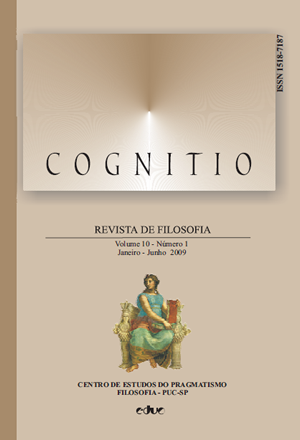Afinidades Eletivas: “Poetry and Imagination” de Emerson como Antecipação à Metafísica Budista-Cristã de Peirce
Palavras-chave:
Idealismo objetivo, Cosmologia evolucionária, Conaturalidade da mente e da natureza, Lógica da abdução, Cosmosemiose, Imaginação poética e científicaResumo
Este trabalho é o primeiro de dois a serem publicados em Cognitio, explorando a hipótese de que o pensamento de Ralph Waldo Emerson (1803-1882), brilhantemente exposto na geração anterior a Charles Sanders Peirce (1839-1914), antecipou, ou mesmo forneceu a origem direta das ideias metafísicas maduras de Peirce. Os trabalhos fornecem comentários contínuos sobre os ensaios da fase posterior de Emerson, “Poetry and Imagination” (1854, publicado em 1876) e “The Natural History of Intellect” (1870).
Métricas
Carregando Métricas ...
Downloads
Publicado
2013-01-25
Como Citar
Dillworth, D. A. (2013). Afinidades Eletivas: “Poetry and Imagination” de Emerson como Antecipação à Metafísica Budista-Cristã de Peirce. Cognitio: Revista De Filosofia, 10(1), 43–59. Recuperado de https://revistas.pucsp.br/index.php/cognitiofilosofia/article/view/13454
Edição
Seção
Artigos Cognitio









